Search
Search Results

Image
Silla Gold Crown
A gold crown of the Silla kingdom, Korea. From the Auspicious Phoenix Tomb, Geumseong (Gyeongju), 5-6th century CE. The crown is made of sheet-gold and decorated with granulation and crescent-shaped jade pendants. The tree-like upright parts...

Image
Gold Silla Crown
A gold crown of the Silla kingdom, Korea. From the Great Tomb at Hwangnam, Geumseong (Gyeongju), 5-6th century CE. The crown is made of sheet-gold and decorated with granulation and crescent-shaped jade pendants. The tree-like upright parts...
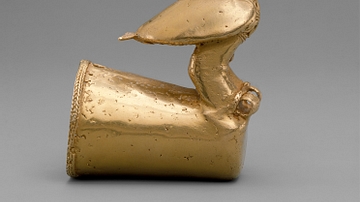
Image
Gold Staff Finial, Zenu Culture
A gold staff finial made by the Zenúes, a people who belonged to the Zenú tribe of ancient Colombia. It features an owl on the edge with a majestic crest, polished golden wings and false filigree openwork on its chest. Distinctive features...
![A Gold Earring from Ur III [Reverse View]](https://www.worldhistory.org/img/c/p/360x202/7468.jpg?v=1713468543)
Image
A Gold Earring from Ur III [Reverse View]
The lower surface of the earring . Six gold spheres were lost and were not replaced. The cuneiform text is read vertically, from the upper surface downwards on each segment, and it continues from right to left. One of a pair of gold earrings...
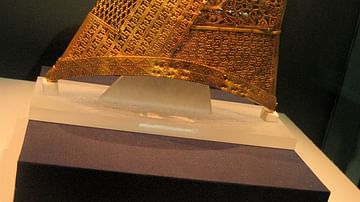
Image
Gold Silla Cap
A gold Silla crown cap from Cheonmaching (the 'Heavenly Horse Tomb'), Gyeongju, Korea. It is made from four gold plates bent and riveted together. 6th century CE. National Treasure No. 189. (Gyeongju National Museum, South Korea)
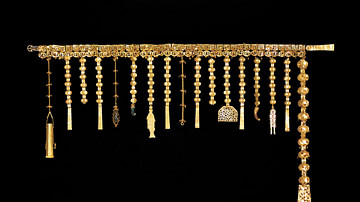
Image
Silla Gold Girdle
A c. 6th century CE gold girdle from the Silla kingdom of south-eastern Korea (57 BCE - 668 CE). From the Gold Crown Tomb, Gyeongju. National Treasure No. 88. (Gyeongju National Museum, South Korea)
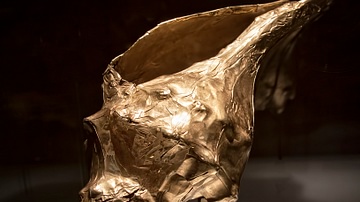
Image
Colombian Gold Snail Shell
Gold snail shell, 100 BCE - 1000 CE. Restrepo, Valle del Cauca, Colombia. 14,8 x 30 cm (5.8 x 11.8 inches). Museo del Oro / The Gold's Museum (Bogota, Colombia).
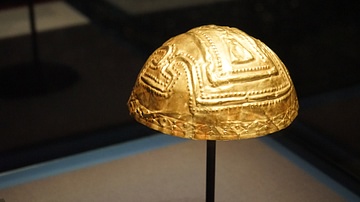
Image
Colombian Gold Helmet
Gold alloy (tumbaga), 500 BCE - 700 BCE. Colombia. Gold was an important material in ancient Colombia. It had a symbolic association with the creative energy of the Sun. This helmet would not have been used in battle but instead would...
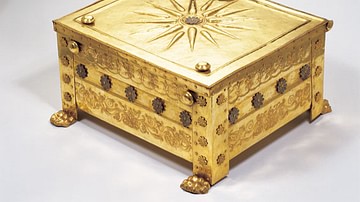
Article
The Royal Macedonian Tombs at Vergina
Excavations at Vergina in northern Greece in the late 1970s CE unearthed a cluster of tombs thought to be the burial site of Philip II (r. 359-336 BCE), the father of Alexander the Great (r. 336-323 BCE), with a wife interred in a vaulted...
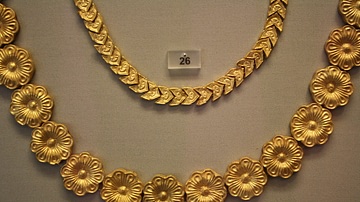
Image
Mycenaean Gold Necklaces, Dendra
A Mycenaean gold necklace from Dendra, 15-14th centuries BCE. (National Archaeological Museum, Athens)